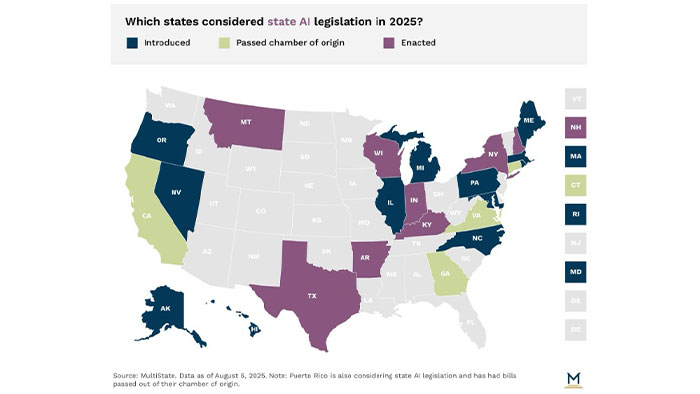AI Legislation Across the U.S.: A 2025 End of Session Recap
- By [ Austin Gold , Townsend Brown ]
- 09/08/2025
Artificial intelligence (AI) dominated state policy debates throughout the 2025 legislative sessions. According to MultiState, lawmakers across all 50 states introduced more than 1,080 AI-related bills this year – a number that reflects both urgency and bipartisan interest. But while the volume is high, the impact has been modest: only 118 bills have become law, a passage rate of just 11 percent. That gap between introductions and enactments reveals a deeper tension – between the desire to mitigate AI’s risks and the fear of stifling innovation. That tension has played out in states like California, Colorado, Connecticut, and Virginia, as well as the halls of Congress. Lawmakers so far have found the most success in passing with narrow, targeted legislation that addresses specific AI-related issues.

Deepfake bills
Deepfake regulation has seen the most traction. Of the 1,080 bills introduced, 301 targeted deepfakes, with 68 enacted – mostly addressing sexual deepfakes through criminal or civil penalties. Political deepfakes saw less attention following pre-election legislation in 2023–2024. A related trend is digital replica laws, which regulate AI-generated likenesses for commercial use. Four states (Arkansas, Montana, Pennsylvania, Utah) passed such laws to protect digital identity and consent. Comprehensive AI regulation States are experimenting with broader AI regulatory frameworks, yielding mixed results. Colorado’s legislature reconvened in August to revisit its landmark AI legislation, focusing on transparency and consumer protection. While no major amendments were adopted, lawmakers opted to postponed the law’s effective date from February to June 30, 2026, allowing time for further consideration during the regular 120-day legislative session beginning in January.California is weighing safety rules for developers, but gubernatorial support is unclear. New York passed, The RAISE Act (NY AB 6453/SB 6953), targeting frontier models with transparency and risk safeguards—pending the governor’s signature. Connecticut’s ambitious regulatory proposal stalled, and Virginia’s bill was vetoed. Meanwhile, Texas enacted a pared-down AI law, focused primarily on government applications.
Other AI legislative trends
Algorithms are increasingly used in health care coverage decisions. Since insurance is state-regulated, lawmakers can more easily pass laws restricting algorithm use in utilization review and prior authorization. Some states now require human oversight or ban AI chatbots acting as therapists. In housing, algorithms help set rental prices, but some jurisdictions are banning this, citing anti-competitive concerns. “Surveillance pricing” has also caught legislative attention, though only Colorado passed a bill (HB 1004) to prohibit algorithmic rent-setting – and it was vetoed. California has pending bills (AB 446, SB 295, SB 384) on algorithmic pricing.Federal Preemption
Looming over state attempts to regulate AI was the attempt this summer by Congress to preempt such laws. A provision in an early version of the One Big Beautiful Bill Act would have issued a ten-year moratorium on state AI regulation, but that was eventually stripped from the enacted version. Still, Senate Commerce Chair Sen. Ted Cruz (R-TX) has drafted a federal AI bill that promises to loosen regulations and could prevent states from taking action.As states continue experimenting with narrow approaches while watching federal debates unfold, the central challenge will be finding a balance. Lawmakers will look to find a way to protect consumers from the risks of AI while ensuring that innovation continues to flourish.
Tags
-
Public Policy
-
Retail Impact


